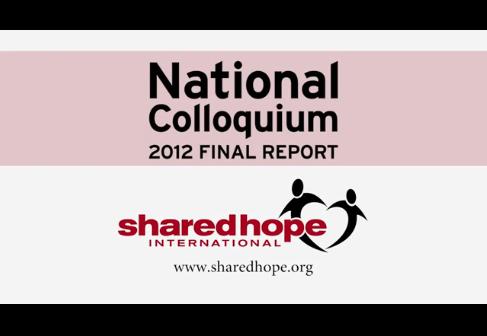Written by: Jessica Garber – Intern at Shared Hope International

On Monday, July 8th, Shared Hope International hosted the release of our 2012 National Colloquium Report, which presents a wealth of perspectives from over 100 provider, survivor, government, advocacy, and funding experts on emerging trends and barriers encountered in attempting to secure restorative shelter and services for juvenile sex trafficking victims and survivors. Moderated by Shared Hope’s Director of Programs, Eliza Reock, the briefing included remarks from leaders in the efforts to combat minor sex trafficking, such as Shared Hope’s Founder, President, and former Congresswoman Linda Smith, Acting Director of the Office for Victims of Crime of the U.S. Department of Justice, Joye Frost, as well as survivor and anti-trafficking advocate Wilthelma TiOra “T.” Ortiz Walker Pettigrew.
15 years ago, Congresswoman Smith started an organization that shed light on a different kind of survivor of a violent crime—the sex-trafficking victim. She spoke of how even though there was a shift in focus to domestic minor sex trafficking between the years of 2005 and 2006, Shared Hope recognized that global services were still needed. To become fully knowledgeable about the subject, Linda and other Shared Hope staff members traveled internationally to meet and speak with survivors. Our organization emphasizes the importance of victim restoration, and understands how crucial the role of long-term restoration is to ensuring that each victim can lead a permanently better life. Our National Colloquium Report uncovers obstacles that victims tend to face while trying to enter this restoration process.
Joye Frost, Director of the Office for Victims of Crime of the U.S. Department of Justice, followed shortly after by discussing the challenges faced when attempting to collect data that adds to the knowledge base of domestic minor sex trafficking: funding, logistics, and the population of victims, which is a difficult population to identify. It is these obstacles that lead to a lack of basic victimization statistics that drive funding, policy, and legislation. Frost stated that the FBI will now collect data on sex and labor trafficking, which could help efforts immensely. She concluded with one certainty—involvement definitely makes a difference; it is vital that the victimized children have a caring and non-judgmental adult in their lives.
T. Ortiz, who was a victim in “the life” from ages 10-17, now holds the esteemed title of being one of Glamour Magazine’s 2011 Women of the Year and a leader of the Human Rights Project for Girls. She spoke about the importance of empowering these victims on all levels, and celebrating and encouraging smaller accomplishments and their personal talents, as well as available opportunities. Since the victims are all different people, with different interests and passions, it is important that therapy can be held in different settings. For example, art therapy or a life coach may be more beneficial for one young woman as opposed to strictly a psychologist.
These three speakers, along with the other panel of talented contributors, gave incredible insight into what issues victims face when seeking restoration, why these issues exist, and suggestions on how to eradicate them. Shared Hope will continue to provide in-depth research to continue this fight for knowledge which can ultimately lead to long-term and positively life-altering restoration for minor sex trafficking victims.
The 2012 National Colloquium Report is available for download here: http://sharedhope.org/wp-content/uploads/2013/05/National-Colloquium-2012-Report-B.pdf
The Report Release can be viewed here: http://vimeo.com/69921098






